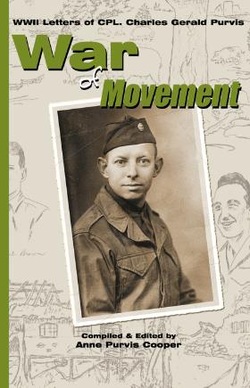About the Author:

Anne Cooper and her family are to be commended for keeping all the letters and pictures that her brother, Gerald, sent home during his service in World War Ii, from August 1942 until the war ended. His tour of duty included Africa,
Italy, France, Alsace and Germany. His life-like pencil drawings of the men in his battery and the sketches of the places traveled make it an interesting account of World War II. Anyone who has an interest in World War II will enjoy this very personal account of the war.
About the Book:

War of Movement; The WWII Letters of Corporal Charles Gerald Purvis
176 pages, 6.14x9.21
ISBN 978-0-9816172-2-0 $14.95
They were rear echelon troops, but they endured prolonged exposure to enemy shelling, strafing, and bombing. They were first engaged in combat in southern Italy. This was followed by the long siege on the beachhead at Anzio, the breakout there and the push to Rome and beyond. Their battalion took part in the amphibious invasion of southern France, advanced to Alsace, and fought in the Vosges Mountains and at Colmar. After crossing into Germany, it was within a few miles of Munich when the war in Europe ended. The story is told in letters received from Cpl. Charles Gerald Purvis, while he served in the army with the 141st Field Artillery Battalion during World War II. The letters cover a period from August 1942, until the war ended and he returned home in October 1945. They were interesting and well written, though often under difficult conditions, and limited by censorship rules. Occasionally, a letter was illustrated with a sketch of an overnight stopping place on the advance through Italy, France, and Germany. There were drawings of the dugout where several months were spent on the Anzio beachhead. On birthdays and holidays, when conditions allowed, family members and friends received hand¬made greetings, designed especially for the occasion. There were some letters reflecting weariness of the war. Scenes of destruction and death along the roadways, described as "inevitable in the trail of war," and large parts of cities re¬duced to rubble affected morale. There was some frustration over delays of all kinds, after the conflict in Europe ended and the long wait to go home began. But most of the letters were optimistic and cheerful and just simply entertaining. The time is long past to bring out these letters. They give a unique account of World War II, as experienced by one enlisted man in his assigned place of duty. It is daily life, as it happened to real people, going about the business of fighting a war.
176 pages, 6.14x9.21
ISBN 978-0-9816172-2-0 $14.95
They were rear echelon troops, but they endured prolonged exposure to enemy shelling, strafing, and bombing. They were first engaged in combat in southern Italy. This was followed by the long siege on the beachhead at Anzio, the breakout there and the push to Rome and beyond. Their battalion took part in the amphibious invasion of southern France, advanced to Alsace, and fought in the Vosges Mountains and at Colmar. After crossing into Germany, it was within a few miles of Munich when the war in Europe ended. The story is told in letters received from Cpl. Charles Gerald Purvis, while he served in the army with the 141st Field Artillery Battalion during World War II. The letters cover a period from August 1942, until the war ended and he returned home in October 1945. They were interesting and well written, though often under difficult conditions, and limited by censorship rules. Occasionally, a letter was illustrated with a sketch of an overnight stopping place on the advance through Italy, France, and Germany. There were drawings of the dugout where several months were spent on the Anzio beachhead. On birthdays and holidays, when conditions allowed, family members and friends received hand¬made greetings, designed especially for the occasion. There were some letters reflecting weariness of the war. Scenes of destruction and death along the roadways, described as "inevitable in the trail of war," and large parts of cities re¬duced to rubble affected morale. There was some frustration over delays of all kinds, after the conflict in Europe ended and the long wait to go home began. But most of the letters were optimistic and cheerful and just simply entertaining. The time is long past to bring out these letters. They give a unique account of World War II, as experienced by one enlisted man in his assigned place of duty. It is daily life, as it happened to real people, going about the business of fighting a war.